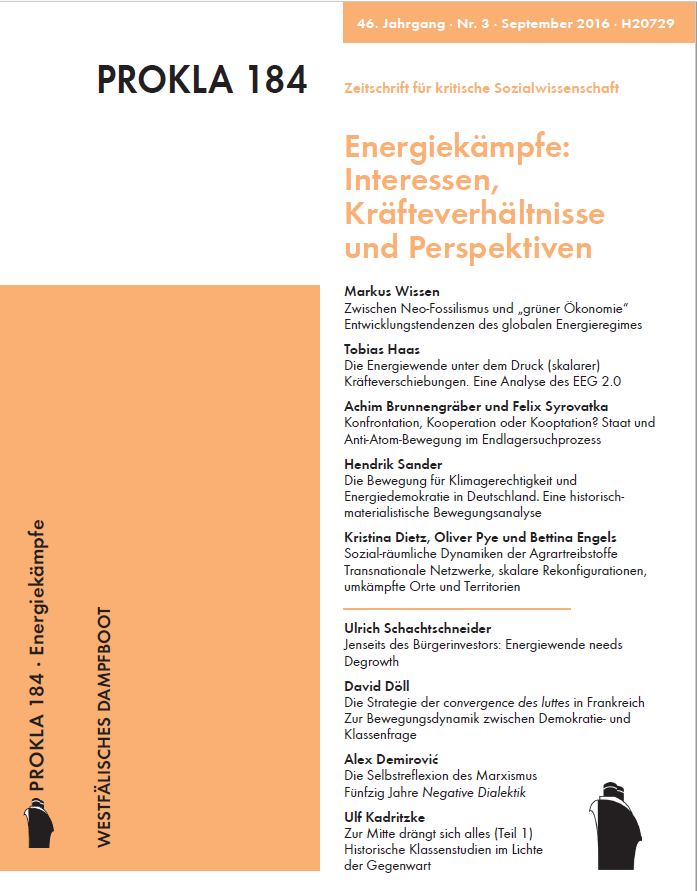Zwischen Neo-Fossilismus und „grüner Ökonomie“.
Entwicklungstendenzen des globalen Energieregimes
DOI:
https://doi.org/10.32387/prokla.v46i184.119Schlagworte:
Fossilismus, Green Economy, Grüne Ökonomie, Energiepolitik, Peak Oil, USA, China, Russland, TransformationAbstract
Capitalism and the fossilist energy regime have been considered so closely interrelated that a crisis of the latter would inevitably raise a major threat for the former, resulting amongst others in growing geopolitical tensions. In critical (Marxist) debates such a crisis has been conceptualized as “peak oil” or “the end of cheap nature” ( Jason Moore). However, the recent boom of unconventional fossil energies particularly in the USA has put such diagnoses in question. The article analyses recent development trends of the global energy regime. Its main argument is that the crucial problem is not so much the peak of scarce fossil resources. Neither is there simply a rising tension between the capitalist core and its geopolitical competitors for reasons of energy supply. Rather, there are multiple energetic conflicts some of which criss-cross the line between the sphere of U.S. hegemony on the one hand and its competitors like China and Russia on the other. The major energetic threat arises from the socially and environmentally destructive power of the (neo-)fossilist patterns of production and consumption. This threat won’t be overcome by a “greening” of capitalism. Instead, overcoming it requires a fundamental transformation of the mode of producing and consuming energy.
Downloads
Literaturhinweise
Altvater, Elmar (2005): Das Ende des Kapitalismus, wie wir ihn kennen. Eine radikale Kapitalismuskritik. Münster.
Appel, Anja (2010): Die Genderbilanz des Klimadiskurses. Von der Schieflage einer Debatte. In: Kurswechsel. Zeitschrift für gesellschafts-, wirtschafts- und umweltpolitische Alternativen 25(2): 52-62.
Bauhardt, Christine (2007): Feministische Verkehrs- und Raumplanung. In: Schöller, Oliver/Canzler, Weert/Knie, Andreas (Hg.): Handbuch Verkehrspolitik. Wiesbaden: 301-319. https://doi.org/10.1007/978-3-531-90337-8_14
BP (2016a): BP Energy Outlook. London, URL: bp.com, Zugriff: 13.7.2016.
- (2016b): BP Statistical Review of World Energy. London, URL: bp.com, Zugriff: 13.7.2016.
Brad, Alina/Schaffartzik, Anke/Pichler, Melanie/Plank, Christina (2015): Contested territorialization and biophysical expansion of oil palm plantations in Indonesia. In: Geoforum 64: 100-111. https://doi.org/10.1016/j.geoforum.2015.06.007
Brand, Ulrich/Wissen, Markus (2011): Sozial-ökologische Krise und imperiale Lebensweise. Zu Krise und Kontinuität kapitalistischer Naturverhältnisse. In: Demirović, Alex/Dück, Julia /Becker, Florian/Bader, Pauline (Hg.): VielfachKrise. Im finanzdominierten Kapitalismus. Hamburg: 79-94.
Bridge, Gavin/Le Billon, Philippe (2013): Oil. Cambridge.
Brie, Michael/Candeias, Mario (2012): Just Mobility. Postfossil Conversion and Free Public Transport. Berlin, Rosa-Luxemburg-Stiftung, URL: rosalux.de, Zugriff: 11.4.2016.
Daniljuk, Malte (2015): America's T-Strategy. Die US-Hegemonie und die Korrektur de US-Außen- und Energiepolitik. In: Prokla 45(4): 529-544. https://doi.org/10.32387/prokla.v45i181.199
- (2016): Globale Umordnung. Geopolitische und geoökonomische Veränderungen im Umfeld der EU - Aktuelle Konjunkturen der Energiepolitik. Berlin, Rosa-Luxemburg-Stiftung, URL: rosalux.de, Zugriff: 4.7.2016.
di Muzio, Tim (2015): Carbon Capitalism. Energy, Social Reproduction and World Order. London.
Dietz, Kristina/Engels, Bettina/Pye, Oiver/Brunnengräber, Achim (Hg. 2015): The Political Ecology of Agrofuels. London/New York. https://doi.org/10.4324/9781315795409
-/Wissen, Markus (2009): Kapitalismus und "natürliche Grenzen". Eine kritische Diskussion ökomarxistischer Zugänge zur ökologischen Krise. In: Prokla 39(3): 351-369. https://doi.org/10.32387/prokla.v39i156.419
European Commission (2015): State of the Energy Union 2015. Commission Staff Working Document on the European Energy Security Strategy. SWD(2015) 404 final. Brussels, European Commission, URL: ec.europa.eu, Zugriff: 9.7.2016.
- (2016): Communication from the Commission to the European Parliament, the Council, the European Economic and Social Committee and the Committe of the Regions on an EU strategy for liquefied natural gas and gas storage. COM(2016) 49 final. Brussels, European Commission, URL: ec.europa.eu, Zugriff: 9.7.2016.
Exner, Andreas/Held, Martin/Kümmerer, Klaus (2016): Einführung: Kritische Metalle in der Großen Transformation. In: Exner, Andreas/Held, Martin/Kümmerer, Klaus (Hg.): Kritische Metalle in der Großen Transformation. Berlin/Heidelberg: 1-16. https://doi.org/10.1007/978-3-662-44839-7_1
Fischer, Severin (2014): Der neue EU-Rahmen für die Energie- und Klimapolitik bis 2030: Handlungsoptionen für die deutsche Energiewende-Politik. SWP-Aktuell 73. Berlin, Stiftung Wissenschaft und Politik, URL: swp-berlin.org, Zugriff: 21.04.2015.
-/Geden, Oliver (2015): Die Grenzen der "Energieunion". SWP-Aktuell 36. Berlin, Stiftung Wissenschaft und Politik, URL: swp-berlin.org, Zugriff: 9.7.2016.
Huber, Matt (2013): Fueling Capitalism: Oil, the Regulation Approach, and the Ecology of Capital. In: Economic Geography 89(2): 171-194. https://doi.org/10.1111/ecge.12006
IEA (2015): World Energy Outlook 2015. Paris, International Energy Agency, URL: iea.org, Zugriff: 22.7.2016.
Kapp, K. William (1988): Soziale Kosten der Marktwirtschaft. Das klassische Werk der Umwelt-Ökonomie. Frankfurt am Main.
Klare, Michael T. (2016): Zu billiges Öl. Die Folgen des Preisverfalls. In: Le Monde diplomatique 22(4).
Mahnkopf, Birgit (2013): Peak Everything - Peak Capitalism? Folgen der sozial-ökologischen Krise für die Dynamik des historischen Kapitalismus. Working Paper 02/2013 der DFG-KollegforscherInnengruppe Postwachstumsgesellschaften. Jena, URL: kolleg-postwachstum.de, Zugriff: 22.7.2016.
Marx, Karl (1857-58): Grundrisse der Kritik der politischen Ökonomie. Berlin 1974.
Moore, Jason W. (2014): The End of Cheap Nature. Or How I Learned to Stop Worrying about "The" Environment and Love the Crisis of Capitalism. In: Suter, Cristian/Chase-Dunn, Christopher (Hg.): Structures of the World Political Economy and the Future of Global Conflict and Cooperation. Berlin: 385-314.
Mühlauer, Alexander (2016): Klares Ja, mit Einschränkung. In Brüssel und Washington wachsen die Zweifel an der Zukunft des TTIP-Abkommens. In: Süddeutsche Zeitung (9./10.7.2016): 30.
O'Connor, James (1988): Capitalism, nature, socialism - A theoretical introduction. In: Capitalism Nature Socialism 1(1): 11-38. https://doi.org/10.1080/10455758809358356
Panitch, Leo/Gindin, Sam (2003): Global Capitalism and American Empire. In: Panitch, Leo/Leys, Colin (Hg.): The New Imperial Challenge. Socialist Register 2004. London: 1-42.
Paterson, Matthew (2007): Automobile Politics. Ecology and Cultural Political Economy. Cambridge MA.
Pichler, Melanie (2013): "People, Planet & Profit": Consumer-Oriented Hegemony and Power Relations in Palm Oil and Agrofuel Certification. In: The Journal of Environment and Development 22(4): 370-390. https://doi.org/10.1177/1070496513502967
Schmalz, Stefan (2015): An den Grenzen des American Empire. Geopolitische Folgen des chinesischen Aufstiegs. In: Prokla 45(4): 545-562. https://doi.org/10.32387/prokla.v45i181.200
Schritt, Jannik (2016): The petro-political configuration: entanglements of Western and Chinese oil zones in Niger. In: Zeitschrift für Wirtschaftsgeographie 60(1-2): 40-56. https://doi.org/10.1515/zfw-2015-0583
Sieferle, Rolf Peter (1982): Der unterirdische Wald. Energiekrise und industrielle Revolution. München.
Urry, John (2013): Societies beyond oil. London-New York.
Wiedmann, Thomas O./Schandl, Heinz/Lenzen, Manfred/Moran, Daniel/Suh, Sangwon/West, James/Kanemoto, Keiichiro (2013): The material footprint of nations. In: PNAS 112(20): 6271-6276. https://doi.org/10.1073/pnas.1220362110
Wuppertal Institut für Klima Umwelt Energie (2005): Fair Future. Begrenzte Ressourcen und globale Gerechtigkeit. München.






